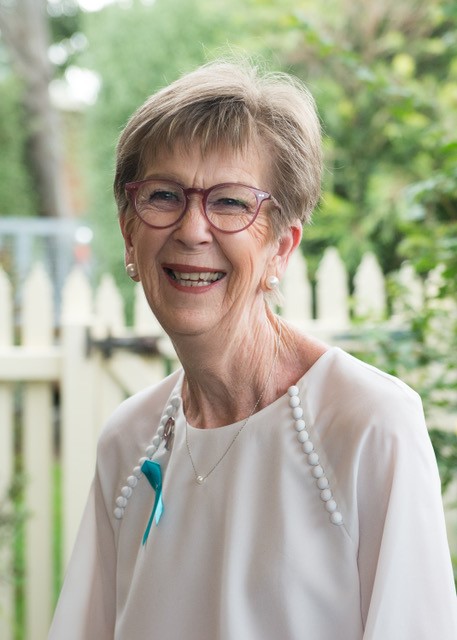In Australia, five women are diagnosed with ovarian cancer every day and three of those women will die. Each year, February marks ovarian cancer awareness month in hopes of opening the conversation about a cancer that isn’t discussed enough.
The five-year survival rate for women diagnosed with ovarian cancer is just 49 percent, making it Australia’s most deadly female cancer. One of the lucky 51 percent, Ann Prunty was 64 years old when she was diagnosed in 2016. Ann showed no symptoms until an after-menopause bleed at work prompted some concern, fortunately, she was working at a medical office and was able to see someone that day.
“I now know that a postmenopausal bleed is not a good sign for any woman, but still it’s really not associated with ovarian cancer, I was very fortunate that I had a GP who got onto it instantly,” says Ann.
The next afternoon Ann was told that she had ovarian carcinoma. Unsure of the seriousness of it at first, she says ovarian cancer is interesting in that you feel well but have a fatal disease. Everyone reacts differently to the news and Ann knew she had to beat it.
“I was determined to be one of 51 percent who would survive five years, it’s just who I am. I think other people really struggle and they think it is a death sentence and for some it is.”
At the time of Ann’s diagnosis and surgery, there was no gynaecological oncology unit in Canberra, so she had to travel to Sydney. Lucky for Ann and her husband, their son lived in Sydney, but she says it would have been an added stressor if not.
“The vast majority of women up until this year had to go to Sydney. Imagine that, especially if you’re a young woman and there are fertility issues, there are children at home,” she says.
Undergoing a radical hysterectomy and oophorectomy was no walk in the park but Ann bounced back determined to beat the cancer.
“I met my oncologist, as I was clip-clopping into her room in my high heels, looking fabulous with my lipstick on and bright colours, she looked at me and said, ‘How long has it been since you had surgery?’ and I said, ‘Oh, it’s actually three weeks today.”
Recognising Ann’s mission to be a good patient, the oncologist wanted to place her on an exercise trial that evaluated the effects of women undergoing chemotherapy for ovarian cancer.
Deciding on 18 weekly chemotherapy treatments, the oncologist prepared Ann for the fact that she would lose her hair. The oncologist also mentioned that Ann’s chance of recurrence was high, offering anecdotal evidence that occurrence was commonly 30 months after the end of treatment.
“Once I had my check-up, we booked an overseas holiday to celebrate that I was clear and whilst we were away, I now realise I had the first signs of recurrence, but I did not recognise them. They were not picked up for another eight months because there is a tumour marker called a CA125 but it’s really unreliable.”
As Ann’s markers stayed normal, it took four doctors before any action was taken- a referral to a gastroenterologist for bowel obstruction, even then Ann wasn’t pushed as an urgent case.
“By the time I was diagnosed with the recurrent I had two bowel obstructions in the small and large bowel, so again back up the highway for more surgery. I do have to say that it’s not a walk in the park and my recovery did take a lot longer,” says Ann.

Another radical surgery saw small and large bowel resections before 6 sessions of chemo spread further apart than the first time. The recurrence meant that Ann was eligible for trial of ICON9, an oral medication, while the fact she has the BRAC2 gene meant she was eligible for the PARP Inhibitor.
“Basically what they do is try and repair the cells that have gone skewwhiff because there is a reason I have ovarian cancer. One of the risks is a family history, my mother had breast and bowel cancer,” says Ann “Unfortunately, one of them was really toxic and after 14 months I had to come off it because it was quality of life not quantity and I had no quality.”
It’s BEAT you have to watch out for says Ann; B is for bloating, E is for eating or feeling full after a small meal, A is abdominal or pelvic pain and T is toilet changes in either urination or bowel movements.
“The trouble, of course, is if you imagine if you present with any one of those four things it could be any number of issues… A UTI or basically anything that a woman experiences during her life.”
After going through this process, Ann encourages other women to advocate for themselves, she says if you have any of the BEAT symptoms recurring then you have to persist with doctors.
“I’m of the generation where you always wear your best underwear for the doctor, they were next to God. Now, they are human…If you’re getting no success with your doctor, go to another one.”
The importance of advocating for yourself goes hand in hand with the lack of effective early detection tests, Ann learned after being diagnosed that regular cervical screenings or pap smears don’t detect ovarian cancer. Something she found was a common occurrence with other people diagnosed with ovarian cancer.
“Pauline from Griffith who died, she was saying to me that she didn’t know that cervical screening didn’t detect ovarian cancer and thought she was totally fine. I said exactly the same, we trotted up every two years thinking we were doing our bit,” she says.
Although she’s not a marathon runner and can be as slack as the next person, Ann believed her level of fitness and overall health helped. She’s never smoked, enjoys wine on a special occasion, exercises regularly and now encourages any woman who is diagnosed to start exercising as soon as possible.
“I don’t care if they walk to the letterbox and back. I was a walker and my anaesthetist said I would like you, if you’re up to it, to just walk 15 minutes a day and I thought ‘Oh for heaven’s sake I usually do about 45.’ Those first few walks were not walks they were shuffles and I was lucky to last ten minutes.”
Since 2019, Ann has spoken to various groups of medical, nursing and allied health students about gynaecological cancer. Ann facilitates the Zoom session by starting out with the statistics and nuts and bolts before introducing three speakers to share their stories- usually two survivors and a caregiver.
During the sessions, Ann says she tries to emphasize that ovarian cancer is not just an old lady disease, it can impact females of any age even before they have finished puberty.
“I have met online because all our stuff is done online, a woman who is now 25 who was diagnosed with ovarian cancer at 13 and had not started menstruating.”
Hoping to encourage medical professionals to be aware of the symptoms and diagnose as soon as possible, Ann holds workshops for students in Canberra, Orange and anywhere that will have them.
“Education of our medical people and research by our scientists are the keys to saving women’s lives. We’ve got to pick any gynaecological cancer up earlier; we must recognise the symptoms earlier.”
It’s not just medical staff Ann wants to inform about the symptoms of ovarian cancer, it is women everywhere. She wants to see it spoken about and researched as much as other female cancers, like breast cancer.
“Breasts are very attractive and ‘down there’ as people still call it is not attractive, it is not something that people want to talk about.”
Find out more about ovarian cancer; ovariancancer.net.au
Canberra Daily is keen to hear from you about a story idea in the Canberra and surrounding region. Click here to submit a news tip.



